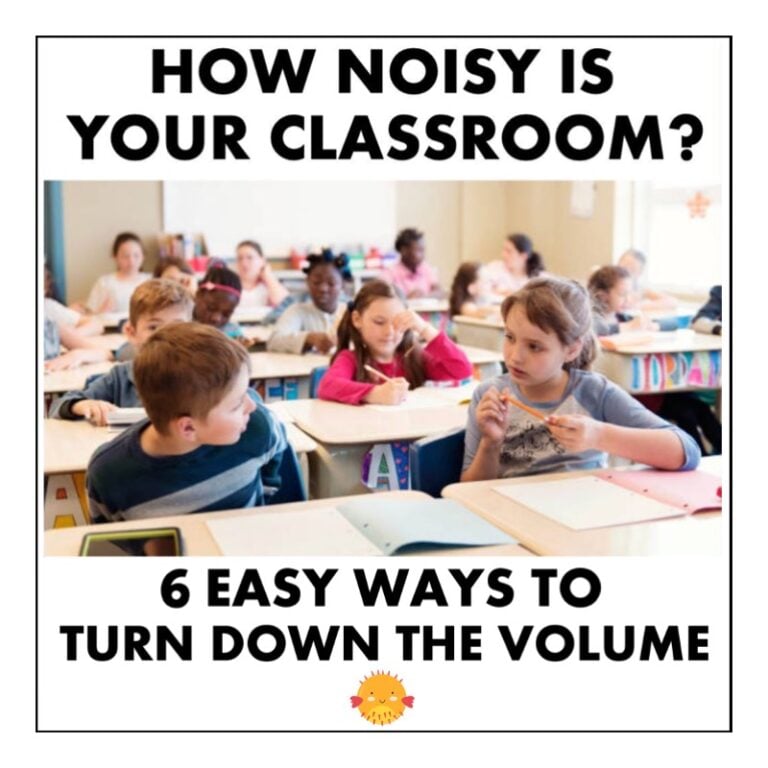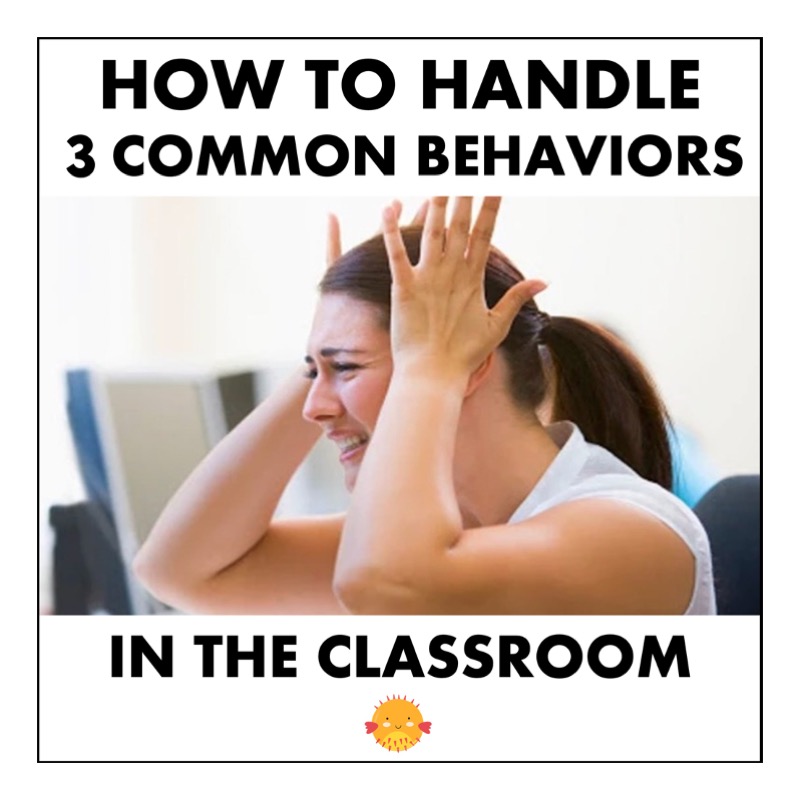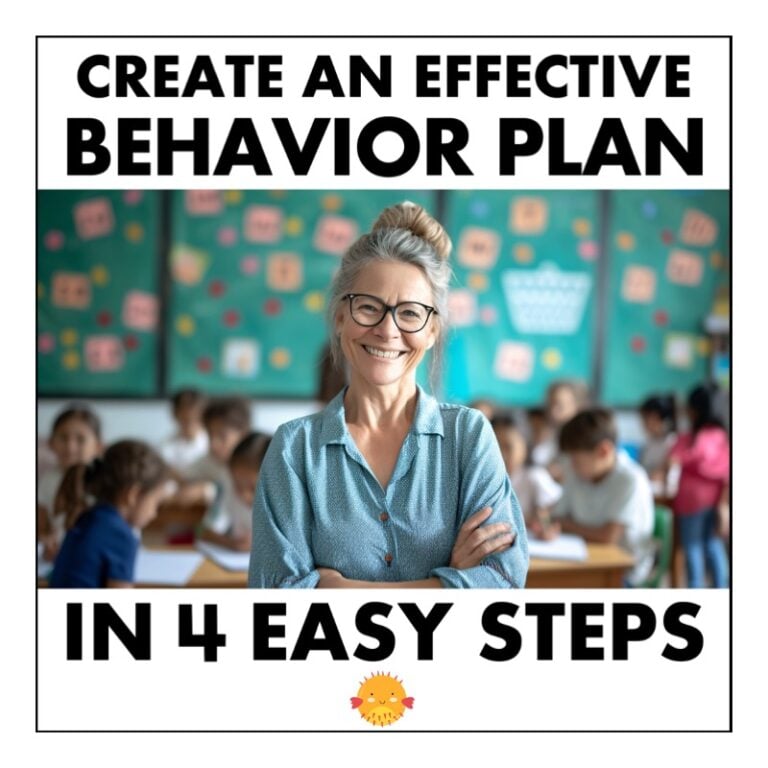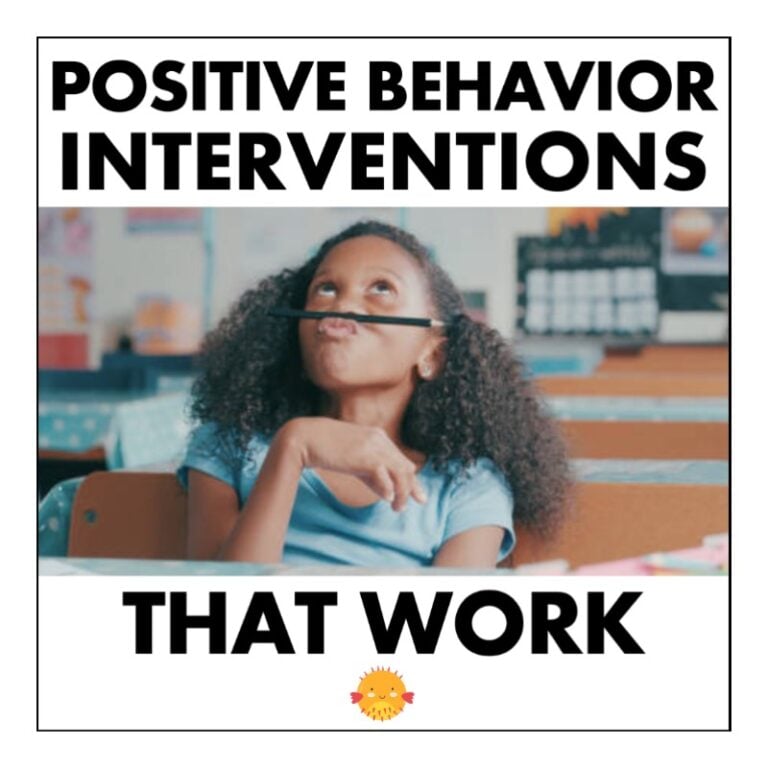
How to Handle Common Behavior Problems: 3 Simple Classroom Solutions
Without mentioning any names, I will say I have one of the most exhausting classes ever this year. Not only do they talk a lot, they blurt out, get up and wander around, announce loudly how bored they are, refuse to work with others in a nice way, and pretty much complain all day long.
Now this isn’t my entire class, of course. It’s a small handful of difficult students that make it feel like the whole class is out to get me. I know you’ve had years like this too. We all do.
So what’s a worn out teacher to do when spring break is still a month away but your sanity ran out a few weeks ago? Let’s look at a how to handle common behavior problems in the classroom and some tips for getting through those long, long days.

.
How To Handle Common Behavior Problems
Despite having a solid classroom management plan, there are three issues in my classroom right now that need to be addressed: excessive talking, whining, and uncooperativeness. These aren’t unusual problems in primary grades, so it’s pretty likely you’ll experience the same thing in your classroom at some point. Let’s look at each one and what you can do about them.
.
The Super Talker

You know the one. Mine comes in the door talking… to everyone, to no one, to himself, to the walls. It doesn’t matter if anyone is listening or not. It doesn’t matter if I’m already talking or not. His mouth runs… all… day… long. Getting him to complete work is tough because he spends so much time chatting.
No amount of discipline stops it because his mouth actually has a will of its own and that will is VERY strong. This type of child will drive an introverted teacher like me (yes, we exist) absolutely crazy.
This type of classroom behavior takes a lot of work to correct because some students just have super social personalities. But there are some temporary solutions that will save your sanity for a bit.
MUSIC
First put on some appealing music. I like the kids indie station on Pandora. This will divert the talker’s attention from his own never-ending dialogue to some other sound. If he talks, he hears himself instead of the music. If he talks, the rest of the class hears him instead of the music. Peer pressure is very powerful.
GUM
Desperate times call for desperate measures! Next, pass out some gum. It’s harder to talk with gum in your mouth. Then, you can institute the “Loose Lips” rule… If you talk with gum in your mouth, I take it away. If I see any evidence of gum sticking out of your lips, I take it away.
Believe me, losing your gum is so so sad to a third grader. Sometimes I do the gum at the same time as the music. But don’t use it too often or your class becomes way too fun and that encourages more disruptive behavior.
HEADPHONES
Last, pull out the headphones for the Super Talker. For some strange reason, if he can’t hear other people talking, he somehow thinks they can’t hear him either. The headphones only work for short periods though. They are especially good during a test because they also help Super Talker focus on what’s in front of him.

If all of the above fails, pull out “The Note” and send your little talker on a very important errand:
Don’t all teachers need a B.R.E.A.K. (Big Red Eraser And Keys) sometimes? If the other teacher is a good friend, she’ll take a long time finding what you need {wink wink}.
.
The Lone Wolf
This type of disruptive behavior is particularly aggravating. This student is the one who refuses to work with anyone. When forced to, the sabotage begins… and it’s always someone else’s fault. As a result, none of the other students want to work with her either. Every group or partner activity turns into an unproductive complain-fest. These challenging students must learn to cooperate and participate in group work, but boy is that a hard lesson to learn!
This is a tough problem to solve because it involves negative attention-seeking behavior… the worst kind in my opinion and the hardest to deal with. So, what to do with such students?
OFFER A BIGGER, BETTER DEAL
Here’s how it works: Announce to the class that today you will be picking partners. Then write two things on the board…
- Complaining or Arguing – I will pick your partners for the next week.
- No Complaining or Arguing – You get to pick your partners next time + ______.
.
Fill in the blank with something the Lone Wolf really likes. In my case, it’s the computer. So I would fill in “10 extra minutes of technology”.
This solution works because it gives everyone an incentive to work cooperatively. They ALL want to pick their own partners and the Lone Wolf really wants that computer time. (If that’s not enough for your little loner, pull her aside and let her know that if she does well this time, next time she can choose to work alone.)
The beauty of the bigger, better deal is that it’s self-perpetuating. Every time they do partner work, the deal is still the same and they are in charge of the outcome. This removes the power struggles this type of student seems to enjoy. And, the more positive experiences they have working with others, the less they’ll engage in that undesirable behavior.
.
Wendy Whiner
Whining is at the top of the list when I prioritize how to handle common behavior problems in my classroom. Whining is the worst!
I actually have three Wendy Whiners this year. No matter what we’re doing, it’s boring, stupid, or too much work and they feel entitled to announce these feelings to the whole class. I also have one who lets his mouth hang open in utter shock whenever a test is announced.
So for these students who like to whine, I have instituted what I call…
BONUS QUESTIONS
“Bonus Questions” might sound like a good thing, but they’re definitely not. It goes something like this…
“If you smile and accept this assignment without complaining, you get the short version. If you whine or complain about the assignment, you get the “bonus questions” (i.e. the long version).
This is an all-or-nothing incentive. One person whining means the whole class gets the bonus questions. There are two reasons for this:
- peer pressure
- there really is no long version of the assignment
.
No matter what they do, they’re going to get the same assignment… but they don’t know that.
I wouldn’t normally encourage tricking small children as one of your classroom management strategies. But again, desperate times call for desperate measures.
This works because the whiners DO NOT, under any circumstance, want more work. So they will bite their tongues and keep their complaining to themselves just to keep the assignment as short as possible.
What they don’t know won’t hurt them and they’ll think they are being rewarded for a positive attitude. In return, you get students who accept the assignment without a battle.
.
How to Handle Truly Problematic Behaviors
Knowing how to handle common behavior issues like the ones above is important. But none of them are serious when you look at the big picture. These are small, common problems that can be handled without punitive measures.
Students who talk to much, whine, or don’t cooperate with others just need a proactive approach and some practice doing the right thing. If a student engages in these behaviors to get the teacher’s attention, the goal is to teach them that positive attention is more desirable than negative attention. Be sure to provide positive feedback and let them know how much you appreciate their good behavior and effort to follow classroom rules.
But sometimes we have students who have serious behavioral issues. Usually there are underlying reasons that need to be addressed.
If you have a student who is displaying physical aggression, frequent foul language, or inappropriate behavior that suggests mental health issues, it’s okay to ask for help.
The first place to start is with your school counselor or school administrators. If the student’s behavior is dangerous or so troubling that your classroom behavior plan isn’t working, a functional behavioral assessment may be in order. They can help you get started with this process.
For interventions that you can use in the classroom setting, I highly recommend the website PBIS World. It is an amazing resources to help you deal with almost any behavioral challenges.



